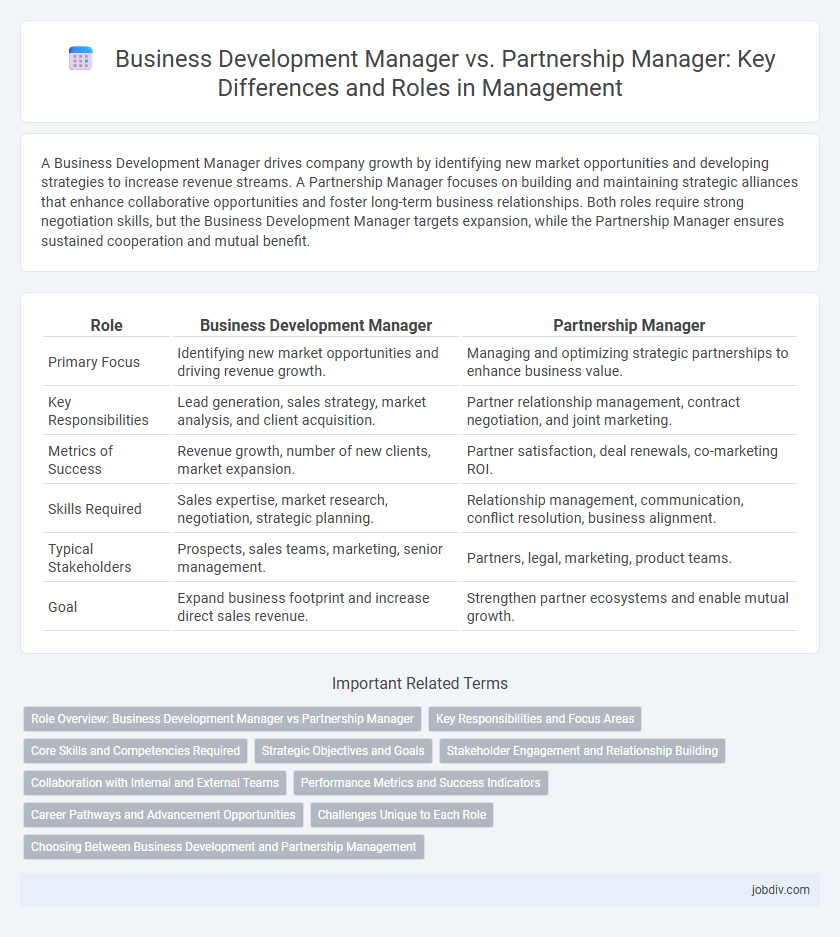A Business Development Manager drives company growth by identifying new market opportunities and developing strategies to increase revenue streams. A Partnership Manager focuses on building and maintaining strategic alliances that enhance collaborative opportunities and foster long-term business relationships. Both roles require strong negotiation skills, but the Business Development Manager targets expansion, while the Partnership Manager ensures sustained cooperation and mutual benefit.
Table of Comparison
| Role | Business Development Manager | Partnership Manager |
|---|---|---|
| Primary Focus | Identifying new market opportunities and driving revenue growth. | Managing and optimizing strategic partnerships to enhance business value. |
| Key Responsibilities | Lead generation, sales strategy, market analysis, and client acquisition. | Partner relationship management, contract negotiation, and joint marketing. |
| Metrics of Success | Revenue growth, number of new clients, market expansion. | Partner satisfaction, deal renewals, co-marketing ROI. |
| Skills Required | Sales expertise, market research, negotiation, strategic planning. | Relationship management, communication, conflict resolution, business alignment. |
| Typical Stakeholders | Prospects, sales teams, marketing, senior management. | Partners, legal, marketing, product teams. |
| Goal | Expand business footprint and increase direct sales revenue. | Strengthen partner ecosystems and enable mutual growth. |
Role Overview: Business Development Manager vs Partnership Manager
Business Development Managers focus on identifying growth opportunities, generating leads, and expanding the company's market presence through strategic sales initiatives. Partnership Managers concentrate on building and maintaining strategic alliances, negotiating contracts, and fostering collaborative relationships that drive mutual business value. Both roles require strong communication skills and market insight but differ in emphasis on direct sales expansion versus alliance management.
Key Responsibilities and Focus Areas
A Business Development Manager primarily drives revenue growth by identifying new market opportunities, developing sales strategies, and fostering client relationships. In contrast, a Partnership Manager concentrates on building and maintaining strategic alliances, managing partner communications, and ensuring mutual business value. While both roles aim to expand business impact, the Business Development Manager targets market expansion and sales, whereas the Partnership Manager focuses on collaboration and joint ventures.
Core Skills and Competencies Required
Business Development Managers excel in strategic market analysis, lead generation, and sales pipeline management to drive revenue growth, requiring strong negotiation, networking, and analytical skills. Partnership Managers focus on relationship building, collaboration, and contract management, necessitating exceptional communication, conflict resolution, and stakeholder engagement competencies. Both roles demand adaptability, project management proficiency, and a deep understanding of industry trends to align business objectives effectively.
Strategic Objectives and Goals
Business Development Managers drive revenue growth by identifying new market opportunities and securing clients aligned with strategic objectives. Partnership Managers focus on nurturing and expanding existing alliances to maximize mutual value and achieve collaborative goals. Both roles contribute to long-term organizational success through targeted strategies but differ in their approach to market engagement and relationship management.
Stakeholder Engagement and Relationship Building
Business Development Managers prioritize identifying new market opportunities and cultivating client relationships to drive revenue growth, emphasizing strategic stakeholder engagement for long-term business expansion. Partnership Managers focus on nurturing existing alliances and collaborating closely with stakeholders to strengthen mutual value, ensuring sustained partnership success and trust. Effective relationship building in both roles is essential for aligning objectives and facilitating seamless communication across diverse business units.
Collaboration with Internal and External Teams
Business Development Managers drive growth by identifying new market opportunities and cultivating client relationships, aligning cross-functional teams like marketing, sales, and product development to execute strategic initiatives. Partnership Managers focus on nurturing and managing existing alliances, coordinating closely with internal departments such as legal, finance, and operations, as well as external stakeholders to ensure mutually beneficial outcomes. Both roles require strong collaboration skills but differ in that Business Development Managers prioritize prospecting and expansion, whereas Partnership Managers emphasize sustaining and optimizing ongoing partnerships.
Performance Metrics and Success Indicators
Key performance metrics for a Business Development Manager include revenue growth, lead conversion rates, and market expansion success, reflecting their effectiveness in driving sales and new business opportunities. A Partnership Manager's success indicators focus on partnership engagement levels, joint venture profitability, and long-term relationship sustainability, highlighting their role in nurturing strategic alliances. Both roles require tracking customer acquisition cost (CAC) and return on investment (ROI) to measure their impact on organizational growth.
Career Pathways and Advancement Opportunities
Business Development Managers focus on expanding market reach and increasing revenue through client acquisition and strategic sales, often progressing toward senior leadership roles such as Director of Business Development or Chief Commercial Officer. Partnership Managers specialize in building and maintaining strategic alliances, with career advancement typically leading to roles like Head of Partnerships or Strategic Alliances Director. Both pathways offer dynamic growth opportunities, but Business Development careers generally emphasize direct revenue generation, whereas Partnership Management centers on long-term collaborative value creation.
Challenges Unique to Each Role
Business Development Managers face the challenge of identifying and capitalizing on new market opportunities, requiring strong strategic insight and adaptability to rapidly changing market conditions. Partnership Managers, on the other hand, must navigate the complexities of maintaining and optimizing long-term relationships, balancing diverse stakeholder interests and ensuring mutual value creation. Both roles demand exceptional communication skills, but the former emphasizes growth-driven innovation while the latter focuses on sustaining collaborative synergy.
Choosing Between Business Development and Partnership Management
Choosing between a Business Development Manager and a Partnership Manager depends on your company's strategic goals and focus areas. Business Development Managers prioritize identifying market opportunities, driving sales growth, and expanding customer bases through lead generation and strategic outreach. Partnership Managers concentrate on building and maintaining long-term relationships with key partners, fostering collaboration, and managing joint initiatives to enhance mutual business value.
Business Development Manager vs Partnership Manager Infographic

 jobdiv.com
jobdiv.com